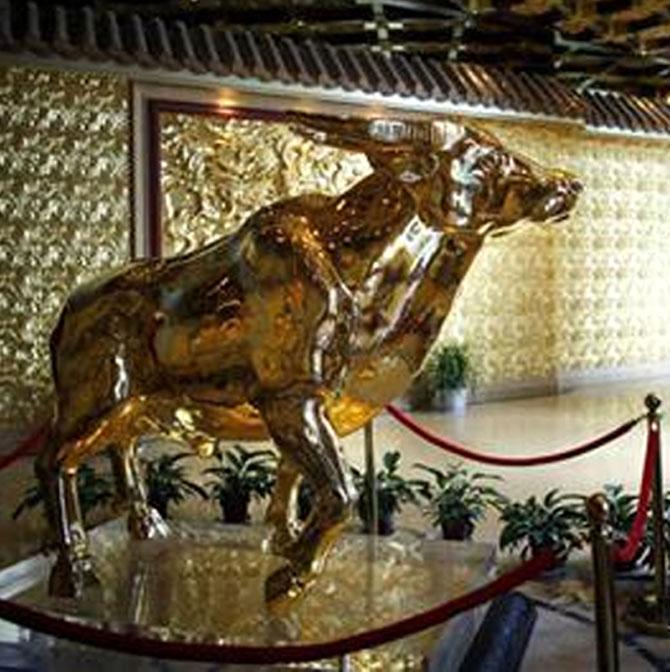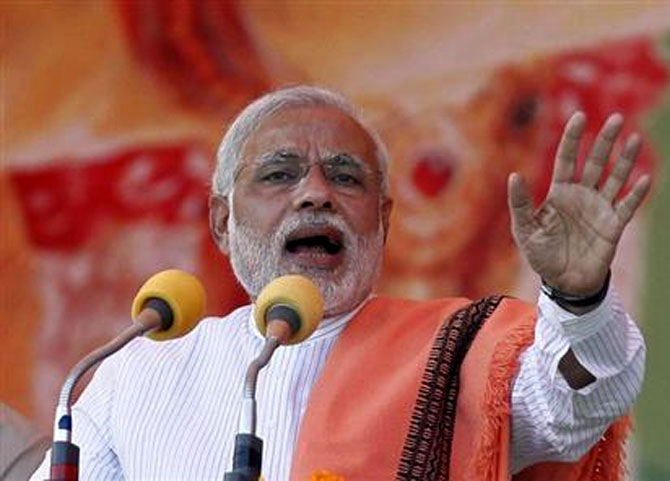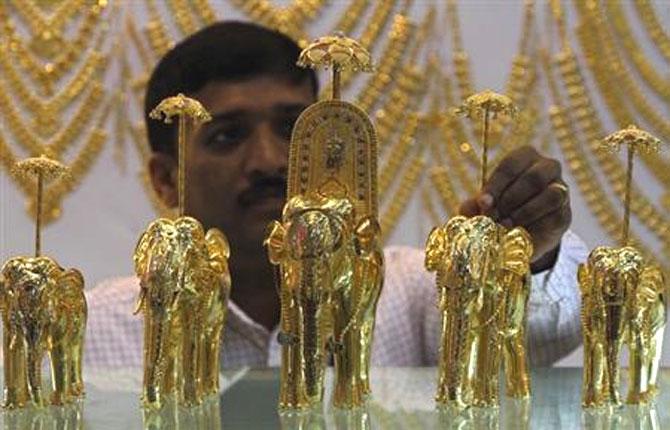Photographs: Carlos Barria/Reuters Clyde Russell
Modi's pro-business Bharatiya Janata Party is likely to roll back some of the tough measures taken by the former government to curtail gold imports, writes Clyde Russell.
Gold bulls tend to flit from one thing to the next in their search for a reason for the precious metal to rally, with the latest hope being Narendra Modi's election victory in India.
The reasoning appears solid enough. Modi's pro-business Bharatiya Janata Party is likely to roll back some of the tough measures taken by the former government to curtail gold imports as part of efforts to lower India's current account deficit.
Gold is India's second-biggest import by value behind crude oil and the former government progressively raised the import duty to 10 percent and imposed a rule that 20 percent of gold shipped in must be re-exported as jewellery.
These measures, which gold bulls had largely dismissed as irrelevant to Indian demand, served to crunch imports, which started dropping sharply from the third quarter of last year.
Indian demand fell 26 per cent to 190.3 tonnes in the first quarter of 2014 from the same period a year earlier, according to data from the World Gold Council (WGC).
This followed falls of 16 per cent in the fourth quarter of 2013 and 32 per cent in the third quarter of last year, declines which saw India surrender its status as the world's top gold consumer to China.
Click on NEXT for more...
Is Narendra Modi the new hope for gold?
Image: Assuming Modi does relax restrictions on bullion and the WGC forecast is met, the impact of additional Indian demand is likely to be felt in the last quarter of 2014.Photographs: Anindito Mukherjee/Reuters
One thing the gold bulls may have correct is that Indian demand is still there, and it has just been hit by government intervention.
The key question is how quickly is Modi's new government likely to lower the import duty or relax the re-export requirement?
While Modi may well be well disposed to the gold sector, he's likely to be swamped with other priorities at the start of his administration.
He's also likely to be reluctant to give a signal that it's "game on" for gold imports again, as he won't want the current account deficit to start heading the wrong way once more.
India's current account deficit was likely about $35 billion in the fiscal year ended March, the former finance minister said on March 31, lower than the $88 billion for the previous year.
At the current spot gold price of about $1,294 an ounce, each additional 100 tonnes of gold imports adds about $4.56 billion to the current account deficit.
If the first quarter demand of 190.3 tonnes was maintained through the year, it would take total demand for the year to about 761.2 tonnes, short of the 900-1,000 tonnes the WGC expects for Indian demand in 2014.
Assuming Modi does relax restrictions on bullion and the WGC forecast is met, the impact of additional Indian demand is likely to be felt in the last quarter of 2014.
Even if India's demand does recover to around 1,000 tonnes in 2014, will that be enough to spark a rally?
Click on NEXT for more...
Is Narendra Modi the new hope for gold?
Photographs: Reuters
China, central bank demand steady
The WGC is expecting demand in top consumer China to be largely steady at about 1,000-1,100 tonnes.
While this level of demand is no doubt supportive for gold prices, it doesn't imply a rally in prices.
There are also some concerns about Chinese demand in the WGC quarterly report, released on Tuesday.
While jewellery demand in China grew a strong 10 per cent in the first quarter from the same period in 2013, investment in bars and coins slumped 55 per cent, leaving overall demand down 18 per cent.
It was the third straight decline in investment demand in China, which may be a sign that investors there are losing patience with gold's inability to rally, and may be starting to worry that the yellow metal's next move is to the downside.
Gold has gained 7.3 per cent so far in 2014, reversing some of its 26.4-per cent decline in 2013.
But after reaching its high of $1,391.76 an ounce on March 17, it has slipped to a close of $1,293.80 on Tuesday and has traded in a relatively narrow band in the last two months.
Click on NEXT for more...
Is Narendra Modi the new hope for gold?
Photographs: Babu/Reuters
Outside of the potential for increased Indian demand, there appear few positive drivers for gold.
The WGC report showed that demand from exchange-traded funds was largely flat in the first quarter, and while this is an improvement from the huge selling seen last year, it's hardly reason to believe a rally is imminent.
Technology demand, which accounts for about 10 percent of total consumption, dropped in the first quarter from the same period a year earlier, and the WGC pointed to rising use of alternatives in electronics manufacturing.
Central bank purchases were also down in the first quarter, and appear to have settled in a range either side of 100 tonnes a quarter, a level that wouldn't provide much price impetus in either direction.
The gold market appears largely in a "wait-and-see" mode, lacking sufficient drivers to move the price.
Increased Indian demand, should the new government allow it, will be a positive, but probably not enough to spark a significant price recovery by itself.






article